Before living on a sailboat, I lived on the thirty-second floor of a high-rise apartment building in downtown Manhattan. I had every amenity a rational person could want: cable internet, central air, a dishwasher, a doorman, a bank of elevators and a room full of clothes washers and dryers. I had a laptop computer, an IPhone, a Blackberry and an IPad, and never left home without at least two of them if not all of them. Seamless Web delivered my dinners, Fresh Direct delivered my groceries, and Amazon Prime delivered just about everything else. All I needed was a direct wire tap connecting me to the grid.
I did ride my bicycle to work everyday; I did compost; I did reuse my Ziploc bags; I didn’t use my air conditioning; I didn’t have a television; and I did ask my cleaning lady to line dry my wet clean clothes. Those are the kind of choices that someone bound to the grid can make, the easy concessions that ease the conscious.
Ten months ago I gave up my apartment; five months ago I gave up my job; and a little more than four months ago we went off the grid.
Living off the grid is surprisingly comfortable and life altering. The things I most worried about (e.g., no cell phone, no microwave, limited hot water) I haven’t missed at all – life goes on quite well without them. Things from land that waste fresh water (e.g., up to 7 gallons to flush a toilet on land) or electricity (e.g., incandescent bulbs) now seem like an unthinkable act of environmental terrorism.
Now nearly every choice we make is tied to conserving – conserving electricity, conserving water, conserving space, conserving money, reusing every box, bottle or bag that comes on board until it’s worn thin, patching holes. Conservation is a refreshing change after so many years of making choices for more, bigger, faster, and more powerful. It makes me thoughtful about what I’m purchasing and why, what I’m doing and how.
Communication
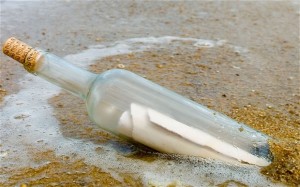 Going incommunicado was the transition to boat life that I most feared. We send our letters home by a message in a bottle. Has anyone received one yet? Maybe we should try carrier pigeons.
Going incommunicado was the transition to boat life that I most feared. We send our letters home by a message in a bottle. Has anyone received one yet? Maybe we should try carrier pigeons.
During our conversation about giving up our cell phones, I cried. I clutched my Blackberry in my right hand and my IPhone in my left. I tried to remember only talking to my parents every Sunday for two years during very expensive, short phone calls from Argentina. I calculated how long it would realistically take for us to get to land, secure the boat and fly home if an emergency at home did happen. I took a deep breath. And I agreed that we could get rid of our cell phones. Jason and I turned in our work phones; I sold my IPhone; and we ported our numbers to Google Voice. If we have the Google Hangouts App open on our computers, phone calls and texts ring directly on our computers. If not, we get an email with the text or a transcript and tape of the voicemail. No one ever calls or texts me (cue small violin), so it hasn’t been a problem. Jason gets text messages and voicemails daily (it seems), so he answers whenever we’re connected to the internet.
 When there is free wifi internet to be had, we use it on the boat. When there’s not, we lug the IPad and sometimes our laptops to shore to use a restaurant or bar’s wifi (and in Mayaguana, the Department of Social Service’s front porch). In quick succession, we download the weather, our emails and the Economist. If the signal is strong enough, we call, Facetime and Skype our families and friends. And if we have time and sufficient signal, we surf Facebook to catch up with friends, we query Google about all the things we’ve been wondering about, and we upload a blog entry. Reading the Economist has alleviated all of my concerns about not knowing what is going on in the world. Long email conversations with old friends and family have alleviated most of my concerns about losing touch with my friends and family.
When there is free wifi internet to be had, we use it on the boat. When there’s not, we lug the IPad and sometimes our laptops to shore to use a restaurant or bar’s wifi (and in Mayaguana, the Department of Social Service’s front porch). In quick succession, we download the weather, our emails and the Economist. If the signal is strong enough, we call, Facetime and Skype our families and friends. And if we have time and sufficient signal, we surf Facebook to catch up with friends, we query Google about all the things we’ve been wondering about, and we upload a blog entry. Reading the Economist has alleviated all of my concerns about not knowing what is going on in the world. Long email conversations with old friends and family have alleviated most of my concerns about losing touch with my friends and family.
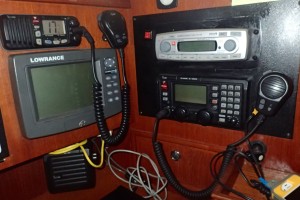 When there is no internet, we have the single side band radio. (I’m a licensed operator!) We use it to talk to other boaters and to listen to the weather reports every morning. We also use it as a modem to send and receive data messages over radio frequencies. Remember dial up? This is much slower and more finicky. It is reassuring to know that we can send and receive messages no matter where in the world we are.
When there is no internet, we have the single side band radio. (I’m a licensed operator!) We use it to talk to other boaters and to listen to the weather reports every morning. We also use it as a modem to send and receive data messages over radio frequencies. Remember dial up? This is much slower and more finicky. It is reassuring to know that we can send and receive messages no matter where in the world we are.
Light My Fire
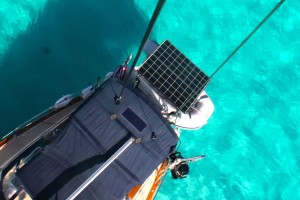 We make our own electricity. We have two solar panels hanging off the back of the boat. When the sun is out (i.e., everyday in the Caribbean), the solar panels charge the batteries. We have a bank of five house batteries. The batteries are brand new (after an entire bank was drained to zero capacity last winter), so they charge quickly and hold their charge indefinitely. We have an inverter that turns the 12-volt DC battery power into 120-volt AC power. Almost all of the boat (lights, pumps, fridge, electronics, water, water maker, etc.) runs off the DC battery power; the outlets run off the AC inverted power.
We make our own electricity. We have two solar panels hanging off the back of the boat. When the sun is out (i.e., everyday in the Caribbean), the solar panels charge the batteries. We have a bank of five house batteries. The batteries are brand new (after an entire bank was drained to zero capacity last winter), so they charge quickly and hold their charge indefinitely. We have an inverter that turns the 12-volt DC battery power into 120-volt AC power. Almost all of the boat (lights, pumps, fridge, electronics, water, water maker, etc.) runs off the DC battery power; the outlets run off the AC inverted power.
All of our lights on the boat are light emitting diodes (LEDs). They last forever, run on DC power, and use a fraction of the electricity used by incandescent bulbs.
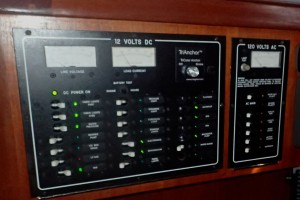 We cut the electricity to everything we’re not actually using, on an electrical panel full of switches. It makes you think twice about turning on lights or plugging in appliances when you have to walk over to the panel and flip the switch first.
We cut the electricity to everything we’re not actually using, on an electrical panel full of switches. It makes you think twice about turning on lights or plugging in appliances when you have to walk over to the panel and flip the switch first.
Blue Moon Water is Better Water
 We make our own fresh water. We have a water maker that uses reverse osmosis to desalinate salt water into about seven gallons of fresh water an hour, which is pumped into our 170-gallon water tank. I estimate that we use no more than fifteen gallons of water a day (maybe closer to ten gallons if we’re showering on land or not doing many dishes), so we only run it every few days to top off the tank. We feel pretty darn lucky to have a water maker when we watch other cruisers dinghying to shore repeatedly to fill their jerry cans with water.
We make our own fresh water. We have a water maker that uses reverse osmosis to desalinate salt water into about seven gallons of fresh water an hour, which is pumped into our 170-gallon water tank. I estimate that we use no more than fifteen gallons of water a day (maybe closer to ten gallons if we’re showering on land or not doing many dishes), so we only run it every few days to top off the tank. We feel pretty darn lucky to have a water maker when we watch other cruisers dinghying to shore repeatedly to fill their jerry cans with water.
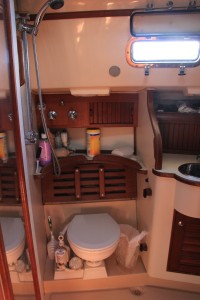 We heat our water by running the water heater (which takes a lot of electricity, so we only do it when plugged into land) or running the diesel engine (which uses the engine’s cooling system’s excess heat to heat the water). We rarely do either. Luckily, it is 85 degrees and sunny everyday in the Caribbean, so cool showers are a welcome treat.
We heat our water by running the water heater (which takes a lot of electricity, so we only do it when plugged into land) or running the diesel engine (which uses the engine’s cooling system’s excess heat to heat the water). We rarely do either. Luckily, it is 85 degrees and sunny everyday in the Caribbean, so cool showers are a welcome treat.
We flush our toilet using seawater, rather than freshwater. The toilet pumps into a holding tank, which we either have pumped out at a marina or dump when we are at least three miles offshore (after a macerator chops the sewage up into tiny pieces).
The water pressure is controlled by a switch on the electronic panel; it’s only on when we’re actually using the water. Even the showerhead has a switch that allows you to stop the flow momentarily while you lather up, without changing the water temperature. I do crazy things like wash down the cockpit floor with dirty dishwater and boil eggs in the excess water from pasta. Anything to save precious fresh water.
Just in Case
Blue Moon has several failsafes built in, so that if we ever do lose our electricity or navigation equipment, we can continue to sail and live fairly well.
In case electricity is lost, we can hand pump fresh water in the sink and we can hand pump the toilet. We also have headlamps, flashlights and a rechargeable lamp. In case the GPS is lost, we can determine our position using the sextant and paper charts; we can calculate our distance travelled through the water using a taffrail log, the Walker knot master; and we can determine the depth of the water using a Nantucket sounder (Jason’s favorite). We hope to never have to rely on any of these.
The Path Not Taken
There are a lot of choices other boaters make to make boat living a bit easier – things like ice makers, air conditioning, extra refrigeration, microwaves, televisions, big water makers, clothes washing machines, fresh water toilets. There are other choices other boaters make to make being off the grid a bit easier – things like wind generators and diesel generators.
None of these are bad choices per se. They’re just not the choices we’ve made. We choose for less – less equipment to break, less toys to distract, less appliances to power, less things to take up space. It’s really a choice for more – more distance from shore we can travel, more time at sea we can spend, more places we can go, more time together enjoying the water, the hills, the fish, the birds.
s/v Blue Moon is made and outfitted to do offshore passages. She’s energy efficient and self-sufficient. She is the only boat I would ever want to go to sea on. And I’d rather be at sea with her than tied up to a dock and plugged into shore. We’ve unplugged from the grid and are not looking back.

Will y’all ever re-enter the grid?
Love this and how you’re living!!! From a Blue Moon lifestyle wannabe :-)
I’m incredibly impressed by what you’ve learned in a short period of time and the choices you’ve made. You’ve made your lives resourceful and respectful of life. It’s a wonderful way to be present in the world around you.
I’m in awe. Mac and I adored being off on our boat for weeks at a time. Your article brought back lovely memories. You are a beautiful writer, Brita. Let’s hope you’re writing a book as you continue your saga.
Thank you so much for taking the time and sharing. As soon to be sailor this is invaluable.